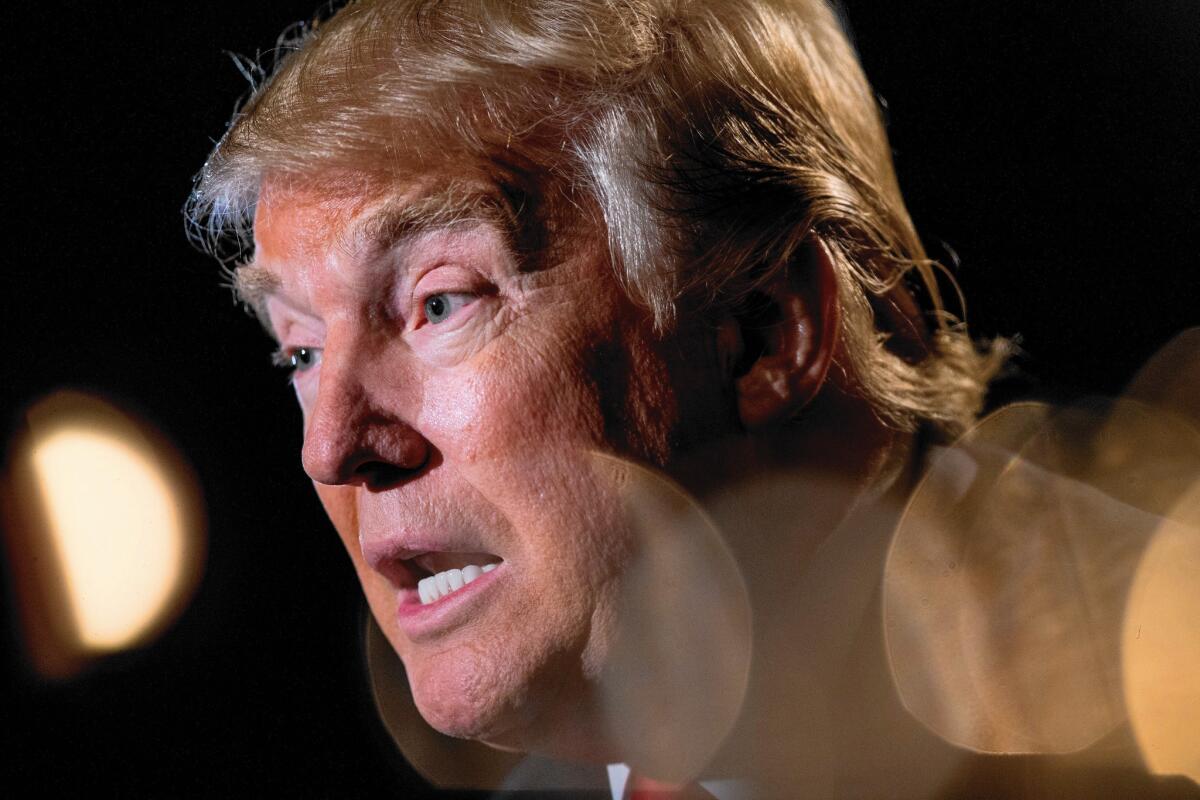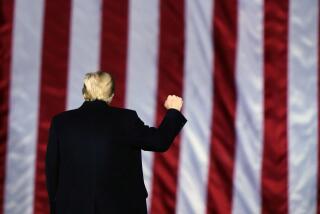Perspective: Trump’s success as an antihero relies on the power of reality TV and drama over reality

The criteria for becoming president changed forever on Sept. 26, 1960. Not as the preternaturally poised Sen. John F. Kennedy won the first televised presidential debate but in the hours before, when then-Vice President Richard Nixon, thin from recent knee surgery and the pressures of campaigning, waved away offers of makeup.
It wasn’t television that made Nixon look sweaty and ill-shaven — it was his refusal to acknowledge the specific demands of it. Since then, the importance television plays in the election of the American president has become such an accepted notion that, even as the nature of television transformed, we stopped paying attention to what it means.
SIGN UP for the free Essential Arts & Culture newsletter >>
Which is why the strong candidacy of Donald Trump continues to take us by surprise.
Reality television has taken much of the blame for Trump’s rise to prominence, and certainly NBC’s “The Celebrity Apprentice” gave him a national brand and insight into our cultural obsession with extremism. Before “The Celebrity Apprentice,” who would have thought Trump’s red-faced form of direct and personal humiliation would have been considered entertainment?
His campaign has many of the miracle-transformation qualities of shows including “The Biggest Loser” and “Ramsay’s Kitchen Nightmares”: “I’ll build a wall” is exactly the sort of quick-fix solution one hears on “Flip This House,” if that show were hosted by the paterfamilias of “Duck Dynasty.”
But it isn’t just the reality ethos shaping this presidential campaign. The proliferation of quality scripted television on a growing number of platforms has created a new, albeit more subtle, influence: Our desire for a good “narrative.”
Every network hosting a presidential debate thus far has rolled it out with soundtracks, promos and graphics as dramatic and emotionally manipulative as any television or film promo. With so many Republican candidates saying so many things, the campaign isn’t so much covered as it is recapped, with reporters and analysts scrambling to follow a story as complicated and high stakes as “Game of Thrones.” To which there have been many references.
Trump understood this from the beginning, and he made it easy. While all candidates attempt to create an emotionally resonant story line — Hillary Clinton spent the summer repositioning herself as a lifelong working mother and now doting grandmother — Trump simply embraced television’s still- most-dominant character: the antihero.
The antihero is admittedly imperfect but says what he thinks and does what he wants, consequences be damned. He is not humble, he is not cautious, he is often offensive and He Does Not Care What People Think. Vic Mackey, Tony Soprano, Jack Bauer, Gregory House, Patty Hewes, Francis Underwood — all politically incorrect, all operating outside the margins and the rules, all simultaneously lovable and loathsome.
For years now we have shivered in delight as these characters have breached the walls of human decency, said and done things no major character, much less a lead character, had previously been allowed to say or do. No matter how awful their actions, we love their willingness to acknowledge the dark mutterings of the human soul, their refusal to apologize for their decisions, their desire to win at all costs.
Trump’s supporters say they admire his willingness to say what he thinks, his refusal to apologize for who he is, his emphasis on making America “win” again. Sure, he’s been divorced and embroiled in scandal. Sure, he has repeatedly made offensive remarks about women and just about every nonwhite, non-Christian American standing. Sure, he says things that aren’t quite true, does things that aren’t quite fair, characterizes his achievements in a way that isn’t quite accurate.
And yes, by calling for a “total and complete shutdown of Muslims” entering the U.S., he is now proposing policy that smacks of fascism.
Who cares? He has built skyscrapers and casinos, starred in his own TV show and made a lot of money. He wants to make America great again and if he has to diminish, demoralize and demonize large swaths of its population to do it, so be it. It’s a “temporary” measure and the rules — of the campaign, of civilized discourse, of democracy itself — are for suckers. He will do it his way; the rest of us can lump it.
What many seemed willing to forget is that the antihero is fictional. The mobster with the gentle seeking heart, the vicious operative working for the greater good, the tyrant that we love to hate are all literary sleights of hand, a form of entertainment and communal introspection.
Mobsters are thieves and murderers, rogue operatives are assassins and terrorists, and tyrants are tyrants prepared to lead through fear and hatred, prepared to dispose of anyone who gets in the way of their quest for power.
MORE:
We cannot accept mass shootings as the new normal
Fox Business Network made GOP debate a safe space
Marvel’s astounding ‘Jessica Jones’ rewrites the definition of superhuman
More to Read
The biggest entertainment stories
Get our big stories about Hollywood, film, television, music, arts, culture and more right in your inbox as soon as they publish.
You may occasionally receive promotional content from the Los Angeles Times.







